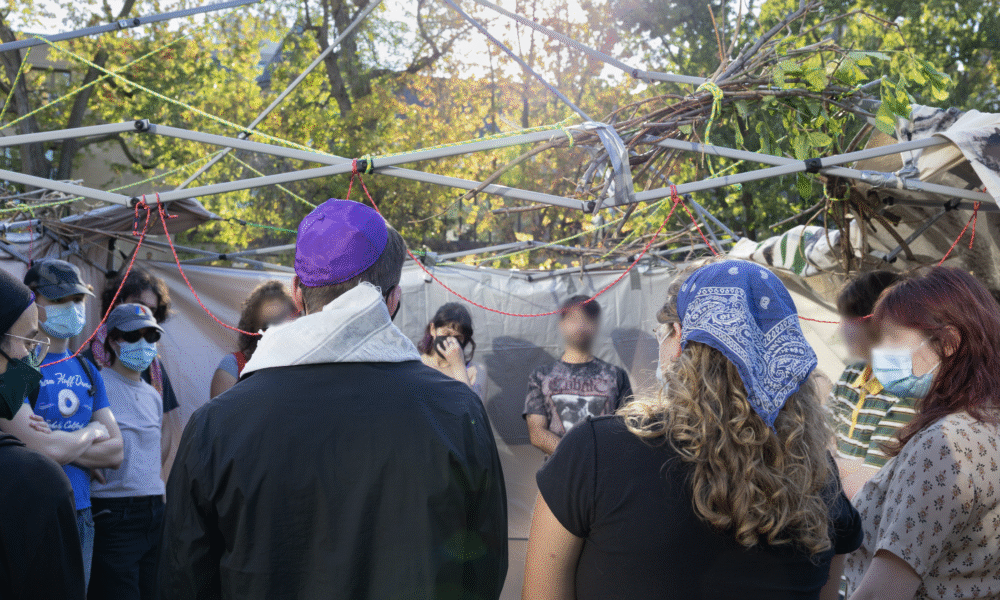The McGill chapter of Independent Jewish Voices (IJV), a grassroots, anti-Zionist, Jewish organization, held an event on Oct. 6 on McGill’s Lower Field to celebrate the Jewish holiday of Sukkot and show their solidarity with Palestinians enduring Israel’s ongoing genocide. Sukkot is a seven-day festival of thanksgiving for the fall harvest, where observers build makeshift huts, known as ‘sukkah.’ The holiday also commemorates the 40 years that the Jewish people spent wandering after their Exodus from Egypt, during which they lived in huts. The IJV event was quickly met with heavy presence from the Service de police de la Ville de Montréal (SPVM).
At 4:00 p.m., members of McGill’s and Montreal’s Jewish communities began building the sukkah on the Lower Field using a pop-up tent. Nearly 50 individuals gathered and made speeches, said prayers, sang, and waved four species of plants—citron, myrtle, palm, and willow—as well as banners reading, “Jews against Genocide/Free Palestine,” “Liberate Judaism from Zionism,” and “L’chaim Intifada”.
In an interview with The Tribune, an attendee who wished to remain anonymous described the significance of the sukkah-building as a demonstration of support for Palestine.
“[A sukkah is] a temporary structure […] [that] you share […] community experiences in,” they said. “We wanted to bring that here today, to be in solidarity with Palestine, [and] to show that we can make the choice to build a temporary structure like this. [….] The people of Gaza, whose homes have been destroyed, they have to live in structures like this. [….] They don’t have the choice.”
Another attendee who wished to remain unnamed explained why they felt it was important to differentiate Judaism from Zionism in times of Palestinian oppression.
“It’s very clear to me that if there is this injustice, it must be addressed, not just because it is a Jewish thing to do, but because it is the human thing,” they stated in an interview with The Tribune. “And […] in that process, we are actually addressing antisemitism, because we are showing a positive version of what Judaism can look like when people have only been exposed to Zionism.”
IJV McGill was one of the bodies who supported the Students’ Society of McGill University’s Legislative Council’s decision to adopt the Policy against Antisemitism in April 2025, which distinguishes between anti-Zionism and antisemitism. Many pro-Israel groups on campus were opposed to its adoption. The attendee spoke to this disagreement.
“[The policy] cites […] historical precedent, […] [and] legal summaries endorsed by a lot of law professors [internationally],” the attendee explained. “I really think that this narrative of the Jewish community [being] so divided, [is] disingenuous and […] misleading. Partially because they’re like every community, […] in a state of trying to figure itself out. We’re doing everything we can to engage in this conversation.”
“I [grew up in] a Zionist perspective,” the attendee continued. “Change is possible. [….] I do think that it is also kind of a mitzvah, a kind of important obligation to try to help people on their journey to having a more open mind.”
Meanwhile, between 4:30 p.m. and 5:00 p.m., approximately 25 SPVM officers arrived at the sukkah. Around ten SPVM Specialized Support and Intervention Section police, or riot police, stood 20 meters away from the gathering.
In an interview with The Tribune, a community member who interacted with the SPVM described how one of the police officers was “mocking” the religious ceremony.
“One police officer explicitly said that he didn’t think this was a religious tent. He was like, ‘It’s just a gazebo,’” the attendee, who wished to remain unnamed, recounted. “[His comments were] pretty demeaning, derogatory, […] borderline antisemitic. [….] [He was] insisting that we don’t have a right to mark this religious service in the way that our faith requires that we do.”
According to the community member, around 5:30 p.m., the SPVM officers threatened to physically intervene in the gathering, claiming the structure had been illegally erected on McGill’s private property.
Though attendees took down the pop-up tent, they gathered to form the sukkah once more using their banners as walls, their bodies as pillars, and the branches in their stretched-out arms as the roof.







